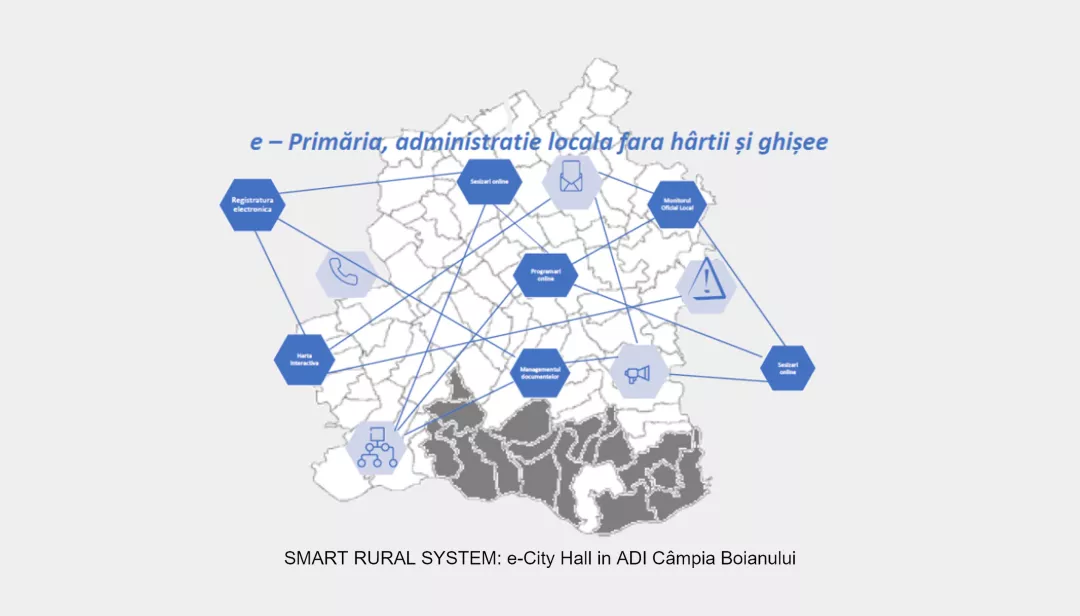General information
RDP Priority
- P6. Social inclusion and local development
RDP Focus Area
- 6B: Local development
RDP Measure
- M07: Basic services & village renewal
Summary
17 communes in Teleorman County, Romania used funds provided by the South Danube Local Action Group for the development of online tools to digitalise their local administrative services. This shortened the time needed to access basic services and improved the relationship between the citizens and their local authorities.
Results
- Digitisation and implementation of software solutions by local authorities simplified citizens’ access to services.
- Interconnection of all services available at the local level on a single platform increased transparency.
- Digitisation of document management processes by interconnecting the back-office systems (electronic registry, payment system, document management) facilitated the operation of the public platform.
Resources
Documents
Links
Context
In many town halls and public offices in rural Romania, citizens need to queue at the local administration offices to submit or obtain documents, pay taxes, or simply to receive information. The 17 communes in Teleorman County, in south Danube, were no exception.
These 17 communes belong to the Intercommunity Development Association (ADI) Câmpia Boianului, which was established in 2011. ADIs are NGOs and it has been obligatory for contingent localities in Romania to establish them since 2009 so that they can access environmental funds from the European Union. The major objective of the ADIs is to support the implementation of zonal/regional development projects and the joint provision of public services.
ADI Câmpia Boianului used funds provided by the South Danube Local Action Group to develop online tools to help digitalise the operations of public institutions at the local level, thereby shortening waiting times and enhancing the relationship between the community and their local administration.
Objectives
The aim of this project was to digitalise the administrative services provided to citizens of ADI Câmpia Boianului and to reduce bureaucracy.
Activities
Activity 1 - Acquisition of multifunctional equipment and licensed software to equip the 17 town halls.
- Procurement of multifunctional printers that support laser printing, automatic double-sided printing, automatic double-sided scanning, as well as monochromatic printing.
- Acquisition of 17 complete software packages for customer relationship management. The software can support the electronic registry, management, classification and distribution of documents. Other services include the submission and verification of online requests for tax certificates and authorisations, as well as the submission of online complaints, appointment bookings and payments.
Activity 2 - Information and publicity campaign to inform citizens about the new digital services.
- Publication of a press announcement in an online newspaper.
- The creation of awareness-raising materials to be disseminated by each local public authority.
- Upon completion of the project, the results were published online.
Activity 3 - The project organised 68 training sessions for the staff of the 17 town halls. Four people from each town hall learned how to implement the new digital procedures.
Main results
The newly established integrated digital platforms provide basic workflows. They streamline document processing, which prevents interruptions and delays in the decision-making process.
Most importantly, the platforms ensure easy online access to public services, available non-stop from home, work, or any other location via PC, laptop or tablet.
Key lessons
The main lessons learnt through completion of the project were that digitisation can play a key role in increasing the transparency of the local administrations. In this way, by improving citizens’ access to the services offered by their local authorities, it also increased the citizens' trust in them.
Almost a fifth of Romanians have still never used the internet and less than a third have at least basic digital skills. Hence, another key lesson is that this project created an opportunity to support people in getting familiar with the internet to access information and to benefit from administrative services that can help them.
“Technological development, but also the measures imposed by the pandemic, have created a favourable context for the intensification of the digitisation process. With it, we can considerably reduce the gap regarding the organization of public institutions in the city compared to those in rural areas.”
Dorina Antonescu - legal representative of the South Danube LAG

